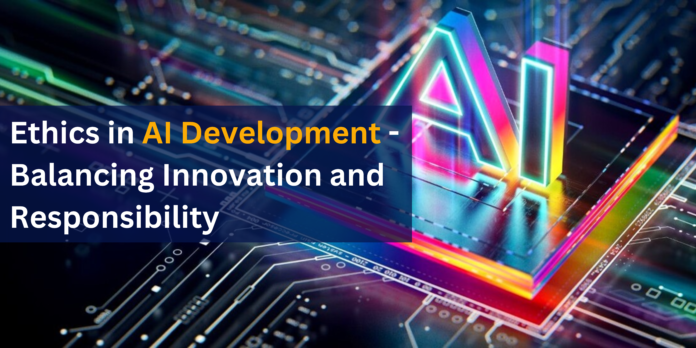Introduction
Artificial Intelligence (AI) is transforming industries and reshaping the world as we know it. From healthcare to finance, AI’s applications are vast and its potential boundless. However, with great power comes great responsibility. As AI technologies advance, so does the need for ethical considerations in their development and deployment. Ensuring that AI systems are designed and used ethically is crucial to balancing innovation with societal good.
This article explores the ethical issues in AI development, principles and frameworks guiding ethical practices, implementation strategies, and future directions for ethical AI.
Understanding Ethical Issues in AI Development
Bias and Fairness
AI systems are only as good as the data they are trained on. Unfortunately, data can reflect existing biases in society. When these biases are embedded in AI algorithms, they can lead to unfair outcomes, such as discriminatory practices in hiring or lending.
Addressing bias in AI involves not only detecting and mitigating biases in data but also ensuring fairness in algorithmic decisions.
Privacy and Data Security
AI often relies on vast amounts of personal data. Ensuring that this data is collected, stored, and used in ways that protect individual privacy is paramount. Data breaches and unauthorized use of data can lead to significant harm.
Implementing robust data security measures and respecting user privacy are essential to maintaining trust in AI systems.
Transparency and Accountability
The “black box” nature of many AI systems makes it difficult to understand how they arrive at certain decisions. This lack of transparency can be problematic, especially when AI systems make critical decisions affecting people’s lives. Ensuring that AI systems are explainable and that there is accountability for their decisions is crucial for ethical AI development.
Ethical Principles and Frameworks
Core Ethical Principles in AI
Ethical AI development is grounded in principles such as beneficence (doing good), non-maleficence (avoiding harm), autonomy (respecting individuals’ rights), and justice (ensuring fairness). These principles guide developers in creating AI systems that are beneficial, fair, and respectful of human rights.
Existing Ethical Frameworks
Several organizations have developed ethical guidelines for AI. For example, the IEEE Global Initiative on Ethics of Autonomous and Intelligent Systems and the European Union’s Ethics Guidelines for Trustworthy AI provide comprehensive frameworks for ethical AI development. These guidelines help developers navigate the complex ethical landscape of AI.
Implementing Ethical AI Development Practices
Ethical AI Design
Designing AI systems with ethics in mind involves incorporating ethical considerations at every stage of the development lifecycle. This includes defining ethical objectives, assessing potential risks, and implementing measures to mitigate those risks. Regular ethical audits can ensure that AI systems remain aligned with ethical standards.
Bias Mitigation Techniques
Several techniques can help mitigate bias in AI systems. These include using diverse and representative data sets, employing fairness-aware algorithms, and conducting regular bias audits. Tools such as IBM’s AI Fairness 360 and Google’s What-If Tool can assist developers in identifying and addressing biases in their AI models.
Ensuring Data Privacy and Security
Best practices for data privacy and security in AI include anonymizing data, implementing strong encryption, and ensuring compliance with data protection regulations like GDPR and CCPA. Regular security assessments and updates can help safeguard data against breaches and misuse.
Case Studies and Real-World Examples
Positive Examples of Ethical AI
Some AI systems have been designed with strong ethical considerations, leading to positive outcomes. For instance, AI in healthcare has been used to predict disease outbreaks and improve patient care while respecting patient privacy. These success stories demonstrate the potential of ethical AI to make a positive impact.
Lessons from Ethical Failures
Conversely, there are examples of AI systems that failed to meet ethical standards, leading to harmful consequences. For instance, facial recognition systems have been criticized for their racial biases. Learning from these failures is crucial for developing better, more ethical AI systems in the future.
Challenges and Solutions in Ethical AI Development
Technical Challenges
Implementing ethical AI is not without its technical challenges. Ensuring fairness, transparency, and security requires sophisticated techniques and tools. Continuous research and innovation are needed to overcome these challenges and develop effective solutions.
Regulatory and Legal Challenges
The regulatory landscape for AI is still evolving. Ensuring compliance with existing regulations and anticipating future legal requirements can be challenging. Engaging with policymakers and legal experts can help developers navigate these complexities and ensure their AI systems meet regulatory standards.
Organizational and Cultural Challenges
Resistance to change can be a significant barrier to ethical AI adoption. Fostering a culture of ethics and responsibility within organizations is essential. This involves training employees, promoting ethical values, and encouraging open dialogue about ethical issues in AI development.
Future Directions in Ethical AI
Emerging Trends in Ethical AI
Innovations and advancements in ethical AI practices are continually evolving. For instance, there is growing interest in developing explainable AI (XAI) systems that offer greater transparency and understanding of AI decision-making processes. These emerging trends promise to make AI systems more accountable and trustworthy.
The Role of AI in Addressing Global Challenges
AI has the potential to address some of the world’s most pressing challenges, such as climate change, healthcare, and poverty. By leveraging AI ethically, developers can create solutions that contribute to the greater good while ensuring fairness and equity.
The Importance of Ongoing Ethical Vigilance
The rapid pace of AI development necessitates continuous monitoring and updating of ethical practices. Organizations must stay vigilant and adaptable, regularly reassessing their AI systems to ensure they align with evolving ethical standards and societal expectations.
Conclusion
Balancing innovation with responsibility is critical in AI development. By addressing ethical issues, adhering to established principles and frameworks, and implementing best practices, developers can create AI systems that are both innovative and ethical.
As AI continues to evolve, ongoing commitment to ethical considerations will be essential to ensuring that AI technologies benefit society as a whole. By fostering a culture of ethics and responsibility, we can harness the power of AI to drive positive change while safeguarding against potential harms.
Read also: – How Artificial Intelligence Can Help Students in Their Academics





